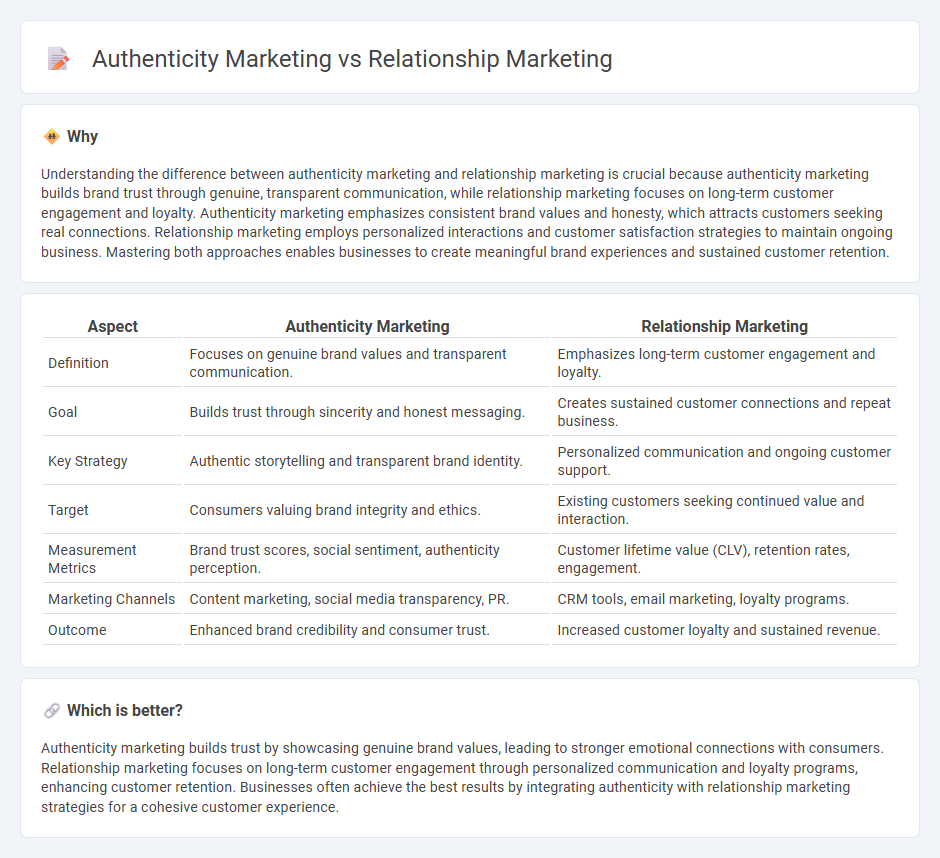
Authenticity marketing emphasizes genuine brand values and transparent communication to build trust with consumers. Relationship marketing focuses on long-term customer engagement through personalized experiences and loyalty programs. Explore how blending these strategies can enhance brand reputation and drive sales growth.
Why it is important
Understanding the difference between authenticity marketing and relationship marketing is crucial because authenticity marketing builds brand trust through genuine, transparent communication, while relationship marketing focuses on long-term customer engagement and loyalty. Authenticity marketing emphasizes consistent brand values and honesty, which attracts customers seeking real connections. Relationship marketing employs personalized interactions and customer satisfaction strategies to maintain ongoing business. Mastering both approaches enables businesses to create meaningful brand experiences and sustained customer retention.
Comparison Table
| Aspect | Authenticity Marketing | Relationship Marketing |
|---|---|---|
| Definition | Focuses on genuine brand values and transparent communication. | Emphasizes long-term customer engagement and loyalty. |
| Goal | Builds trust through sincerity and honest messaging. | Creates sustained customer connections and repeat business. |
| Key Strategy | Authentic storytelling and transparent brand identity. | Personalized communication and ongoing customer support. |
| Target | Consumers valuing brand integrity and ethics. | Existing customers seeking continued value and interaction. |
| Measurement Metrics | Brand trust scores, social sentiment, authenticity perception. | Customer lifetime value (CLV), retention rates, engagement. |
| Marketing Channels | Content marketing, social media transparency, PR. | CRM tools, email marketing, loyalty programs. |
| Outcome | Enhanced brand credibility and consumer trust. | Increased customer loyalty and sustained revenue. |
Which is better?
Authenticity marketing builds trust by showcasing genuine brand values, leading to stronger emotional connections with consumers. Relationship marketing focuses on long-term customer engagement through personalized communication and loyalty programs, enhancing customer retention. Businesses often achieve the best results by integrating authenticity with relationship marketing strategies for a cohesive customer experience.
Connection
Authenticity marketing fosters genuine brand transparency and trust, which forms the foundation for relationship marketing by encouraging long-term customer loyalty and engagement. Relationship marketing leverages authentic communication to create meaningful connections with consumers, enhancing customer retention and lifetime value. Both strategies prioritize sincerity and personalized interactions to build a strong brand-consumer bond.
Key Terms
Relationship Marketing:
Relationship marketing emphasizes building long-term connections between brands and customers through personalized communication and customer-centric strategies. It fosters loyalty by valuing trust, consistent engagement, and emotional bonds, ultimately enhancing customer retention and lifetime value. Discover how to leverage relationship marketing to strengthen your brand's customer base and drive sustainable growth.
Customer Retention
Relationship marketing emphasizes building long-term connections through personalized communication and trust, directly enhancing customer retention rates. Authenticity marketing centers on genuine brand values and transparency, fostering emotional loyalty and repeated engagement from customers. Explore how blending both strategies can maximize retention and deepen customer relationships.
Loyalty Programs
Loyalty programs in relationship marketing emphasize incentivizing repeat purchases and strengthening long-term customer relationships through rewards and personalized offers. Authenticity marketing leverages transparent communication and genuine brand values within loyalty programs to build trust and emotional connections, fostering deeper customer loyalty. Explore how integrating authenticity into loyalty strategies can transform customer engagement and retention.
Source and External Links
What Is Relationship Marketing? | Definition from TechTarget - Relationship marketing is a facet of CRM focused on customer loyalty and long-term engagement, aiming to create strong emotional connections that foster repeat business and word-of-mouth promotion, as opposed to just short-term sales goals.
Relationship Marketing: The Ultimate Guide - Relationship marketing is a strategy emphasizing customer retention, satisfaction, and lifetime value by building emotional bonds that encourage loyalty and referrals, proven to increase revenue and reduce costs compared to acquiring new customers.
Relationship Marketing: 5 Ways to Create Lifelong ... - Key to relationship marketing is creating emotional connections with customers, fostering brand communities, incorporating customer feedback, and providing exclusive offers to enhance loyalty and customer lifetime value.
 dowidth.com
dowidth.com